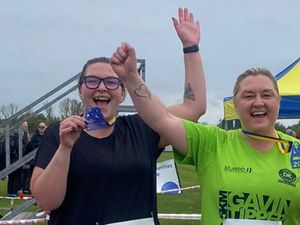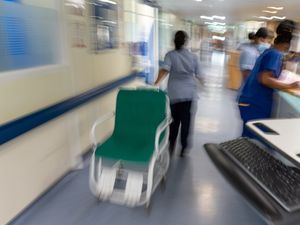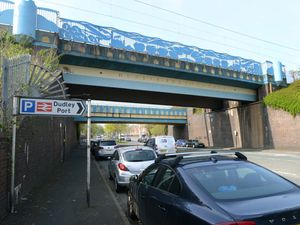I'd spent years treating stroke victims - then I became one myself
For well over a decade former senior nurse Helen Dowell cared for stroke patients on a daily basis at Walsall Manor Hospital as a ward manager.
Spending 15 years in the field the mother of two loved her job, but in 2001 the unthinkable happened.
At the age of just 34, 15 months after the birth of her twins Eloise and Ryan she suffered a devastating stroke, leaving her unable to walk and talk.
The mother-of-two, who ended up being treated on the very ward on which she used to work, now looks back on that day in 2001 as the end of her old life and the start of a very different one.
Helen was home alone and had just the children to bed when she started to feel dizzy.
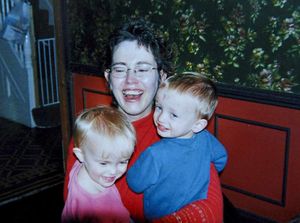
She quickly rang her husband Ian, 46, who is a doctor. He rushed to their home in Willenhall and instantly realised that something was badly wrong.
Helen, now 48, said: "I think he knew what was happening to me but voicing his concerns would have meant facing his fears.
"I had no idea what was wrong. The classic symptoms that we see on the TV ads of a drooping face, slurred speech, not being able to raise your arm - none of that was known back then. As far as I was concerned, I just felt giddy."
Helen's late mother Ann Draper dashed over to look after the children, a role she took on for the next five months as her daughter split her time between the Manor and the Queen Elizabeth Hospital, Birmingham, for treatment.
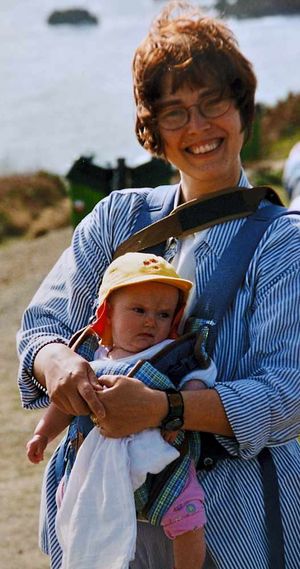
"It was horrible being separated from the kids but they were brought in to me every day. I don't think there was a day when I didn't see them," she said.
"On a selfish level, I was more concerned about what was happening to me. I was bored and frustrated with not being able to do the things I used to. I don't know whether the selfish thing was just me or whether other stroke patients feel it. The twins used to tire me out. They were too young to realise."
The former Willenhall Comprehensive pupil, who grew up in Wolverhampton Road, Birchills, had led a very active life before her stroke. She belonged to a cycling club and went on bike rides most weekends. She also swam and walked and had enjoyed a skiing holiday in the late 1990s. Now she loves embroidery.
As a result of the illness, she decided to quit her job at the Manor and forge a new career working for the Stroke Association.
In her extraordinarily matter-of-fact manner, she talks of coming to terms with her new life.
"The things I could to do before were now impossible. Once I'd accepted I couldn't do my job anymore, everything else, like my pastimes, followed on. The embroidery keeps my mind active.
"I knew that my life as before was over but I didn't think my life was over, it was a beginning."
With May appointed Action on Stroke month, Helen has decided to share her story as a way to give other patients hope.
For anybody suffering from a stroke, the first few minutes are vital to their chances of recovery.
"The sooner somebody who is having a stroke gets urgent medical attention, the better their chances of a good recovery," says the Stroke Association.
The Stroke Association is calling for people to support the Fast Forward campaign by learning the signs of a stroke and sharing the message to help save more lives. It urges people to use four simple steps to decide whether somebody is need or emergency help:
Face has their face fallen to one side? Can they smile?
Arms can they raise both arms, and keep them there?
Speech is their speech slurred?
Time if the patient demonstrates any one of these signs, it is time to dial 999.
Elaine Roberts, Director of Life After Stroke Services for the Stroke Association in the region, said: "When it comes to stroke, time lost is brain lost. A stroke is caused by a blockage or a bleed in the brain, which cuts off the brain's flow of oxygen and causes brain cells to die.
"So recognising the symptoms of stroke and calling 999 for an ambulance as quickly as possible is absolutely vital.
"Acting FAST can help reduce the devastating impact a stroke can have
She said a survey found that 14 per cent of people in the West Midlands wrongly believed a stroke could never happen to them.
"Sadly this cruel condition can happen to anyone at any time.
In 2004 whilst visiting the ward where she used to work, she realised that being around stroke patients was something she wanted to continue to do. She applied for a job at the Stroke Association's Walsall office and is now branch administrator.
"When I was offered the job with the Stroke Association I felt like me again. I love coming to work each day and especially working closely with those affected by stroke.
"Of course there are limitations now but I don't think people expected me to recover as well as I have. I was determined to get better, I really focused on that. The twins have never known anything different. In fact I sometimes wonder whether if I was 'normal', they would have ended up doing as much as they have.
"Employers should be more willing to make adaptations so that people with disabilities get back to work if they can. What I do now is obviously less taxing physically but there's nothing wrong with me mentally. I can still think and make decisions. This may be anecdotal but workers with disabilities also tend to be more reliable and have less time off sick."
Research by the Stroke Association shows that the number of strokes in working people, aged 20 to 64, in the West Midlands has risen by 16 per cent in the past eight years. The number of women, aged 40 to 54, admitted to hospital in the same period has risen by 42 per cent - rising from 391 in 2007, to 557 in 2014.
While the number of strokes in men, aged between 40 and 54, has risen by almost 50 per cent in less than 15 years.
Last year there were over 675 hospital admissions of men in the region. It is thought that this mainly due to increasing less active and unhealthy lifestyles, and changes in hospital admission practice.
Stroke Association chief executive Jon Barrick said: "These figures show that stroke can no longer be seen as a disease of older people. There is an alarming increase in the numbers of people having a stroke in working age.
"This comes at a huge cost, not only to the individual, but also to their families and to health and social care services.
"The simple truth is that we must do more to raise people's awareness of risk factors, to help prevent them from having a stroke.

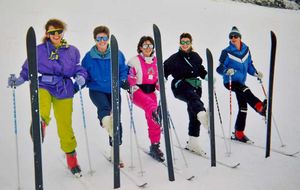
"With many more stroke patients now receiving emergency medical treatment, we also need the right health and social care services available.
"People must have the support they need to make the best possible recovery and avoid having to cope for decades with the disabilities that stroke can bring."
Overall, stroke costs the economy around £9 billion a year. Loss of income, due to death and disability from stroke alone, is more than £1.3bn each year.
A survey of businesses regarding their attitudes on the impact of stroke on their staff showed that just one in 20 employers recognised cognitive difficulties as a symptom of stroke.
The Stroke Association provides advice and practical support to help stroke survivors return to employment.
For more details 0303 303 3100 or visit www.stroke.org.uk

